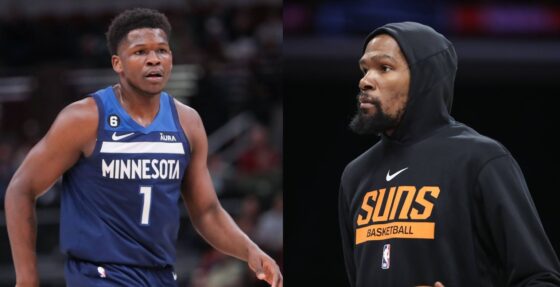The Timberwolves’ playoff exit frustrated fans for a familiar reason—plenty of talent, but something just felt off. The easy fix? Chase a superstar. The right fix? Less flashy, and all about the guy who kept getting trapped in the backcourt like a sedan in a snowbank.
Here’s the cold truth: Minnesota doesn’t need Kevin Durant. They need someone who can actually dribble past half-court without triggering a midlife crisis. As Bill Simmons bluntly put it, “I think [Edwards] needed a [expletive] point guard.” Mike Conley, bless him, was so over-matched against OKC’s pressure that Simmons joked he “looked like he was 50 years old.” This wasn’t about scoring—it was about basic functionality. The Wolves’ offense didn’t sputter because they lacked firepower; it died because they couldn’t even get to their sets.
The evidence was painfully clear. Lou Dort treated Conley like a practice cone. “Poor Mike Conley is 37,” Simmons sighed, imagining him “seeing nightmares of Lu Dort [and] Caruso.” Durant doesn’t fix that. He’s not magically solving the fact that Edwards had to play point guard, bailout shooter, and primary scorer all at once.
May 26, 2025; Minneapolis, Minnesota, USA; Minnesota Timberwolves guard Mike Conley (10) shoots the ball past Oklahoma City Thunder guard Shai Gilgeous-Alexander (2) in the second half during game four of the western conference finals for the 2025 NBA Playoffs at Target Center. Mandatory Credit: Bruce Kluckhohn-Imagn Images
The deeper issue? This isn’t just about one bad series. Conley’s been a steady hand, but Father Time is undefeated. The Wolves need a guard who can handle defensive heat, not another iso scorer who’ll leave them grinding in the half-court. Durant’s a luxury; a real floor general is a necessity.
Mike Conley’s production in the Conference Finals was, frankly, a concern—averaging just 4.4 points, 2.2 rebounds, and 2.4 assists while shooting a dismal 21.2% from the field and 28.6% from deep. Those numbers won’t cut it if the Timberwolves are serious about getting over the Western Conference hump after back-to-back flameouts. That’s where Rob Dillingham enters the frame.
The OKC series didn’t just highlight Minnesota’s offensive struggles—it underlined how critical Dillingham’s development will be to both their short- and long-term future. If he can become a reliable backup point guard as early as next season, it could be a game-changer, especially with Conley likely nearing the twilight of his career.
So before Minnesota starts fantasizing about Durant, they should ask: What’s the point of adding a flamethrower if you don’t have anyone to light the match? Simmons is right—this team’s ceiling depends on fixing the engine, not just polishing the hood.
The Kevin Durant Pipe Dream: Why Minnesota Can’t (And Shouldn’t) Make It Happen
On paper, swapping an aging Mike Conley for Kevin Durant sounds like trading a bicycle for a fighter jet. But the Timberwolves aren’t just negotiating with Phoenix—they’re battling math, the salary cap, and their own $93 million luxury tax bill. Sure, it’s possible. Just like it’s possible to win the lottery while getting struck by lightning… and then audited by the IRS.
The financial reality is brutal. Minnesota Timberwolves is already deep into the NBA’s second luxury tax apron, where every additional dollar spent triggers exponentially harsher penalties. Adding Durant’s $54 million salary wouldn’t just push their payroll to nearly $200 million. It would trigger a tax bill so massive that even billionaire ex-owner Glen Taylor might wince. Last season, the Wolves paid $93 million in luxury taxes alone—second highest in the league. And that was before considering Durant’s contract. The league’s new CBA hits repeat tax offenders like Minnesota with roster-building restrictions so severe it locks them into this core, flaws and all.
Even if they somehow thread the needle financially, the basketball logistics are worse. The Wolves would need to gut their roster just to match salaries. That likely means shipping out Rudy Gobert or Julius Randle, plus filler contracts like Naz Reid or Mike Conley. Phoenix would demand young talent like Jaden McDaniels (who Minnesota has rightfully deemed untouchable) or the few remaining draft picks not already owed to Utah. And all this for a 37-year-old Durant who, as Shams Charania reported prefers something different. The Wolves would be sacrificing their present and future for what might be a one-year rental—before Durant forces his way out.
There’s a reason championship teams rarely build through desperation trades like this. The 2023 Suns—who went all-in on Durant only to miss the playoffs this year entirely—should serve as a cautionary tale. Minnesota’s path to contention isn’t mortgaging their future for an aging superstar. It’s developing Edwards and McDaniels while finding that elusive point guard who doesn’t crumble under playoff pressure.
So yes, technically, the Timberwolves could trade for Kevin Durant. And yes, Anthony Edwards would love to play with him again. But should they? Unless they enjoy financial handcuffs, roster chaos, and a potential superstar walkout, the answer is a hard no. Some dreams are better left unrealized.
The post Kevin Durant Trade Is a Must-Avoid for Timberwolves Because of Anthony Edwards appeared first on EssentiallySports.
